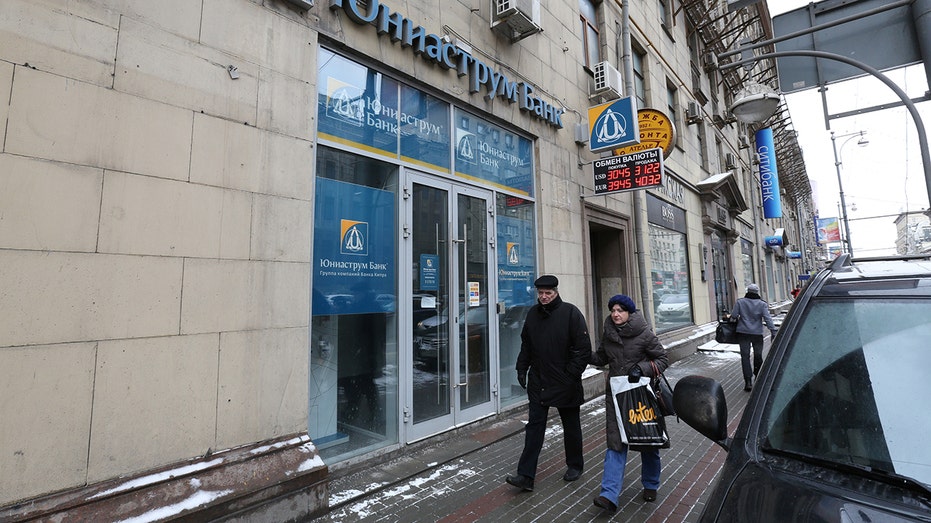Russian economy poised to crash as sanctions take their toll
Russian economy could contract 10% this year, Goldman economists say
Market grapples with inflation, Russia-Ukraine war
Solus Alternative asset management strategist Dan Greenhaus examines the state of the market on 'Making Money.'
The Russian economy is poised to collapse this year after the U.S. and its European allies hit the Kremlin with a slew of crippling financial penalties over its unprovoked invasion of Ukraine.
Russian manufacturing activity plunged in March, contracting at the sharpest pace since May 2020 as businesses confronted a sharp rise in prices and a big decline in new orders. Western sanctions have effectively isolated Russia from the international financial system and prevented it from accessing new technology.
Experts think that is just the beginning of a major slide for the Russian economy this year.
The Institute for International Finance (IIF), a Washington-based think tank, estimated that Russian gross domestic product, the broadest measure of goods produced in a nation, could plunge by 15% in 2022 and 3% in 2023 as a result of the sanctions, wiping out decades of growth. A contraction of that size would be about twice as sharp as the Russian recession during the global financial crisis in 2008.
RUSSIA INVADES UKRAINE: LIVE UPDATES
"Further escalation of the war may bring more boycotts of Russian energy, which would drastically impair Russia's ability to import goods and services, deepening the recession," the IIF said in an analyst note last month.
At the same time, Goldman Sachs forecast the economy could shrink by 10% this year — having previously predicted growth of about 2% — while Capital Economics is forecasting a 12% contraction. Barclays economists, including Brahim Razgallah, said in an analyst note that the Russian economy could plunge by as much as 12.4% in 2022.

Russian President Vladimir Putin attends a meeting with young award-winning culture professionals via videoconference in Moscow, Russia, Friday, March 25, 2022. (Mikhail Klimentyev, Sputnik, Kremlin Pool Photo via AP, file / AP Images)
"Due to the current geopolitical conditions, we assume sanctions will be long-lasting," they wrote.
Western allies targeted Russia with severe financial penalties following the Feb. 24 invasion of Ukraine, including cutting off a key part of the Central Bank of Russia by preventing it from selling dollars, euros and other foreign currencies in its roughly $630 billion reserve stockpile; blocking certain financial institutions from the Swift messaging system for international payments; and sanctioning hundreds Russian lawmakers and elites who have close ties to President Vladimir Putin.
On top of that, hundreds of Western companies — including Coca-Cola, McDonald's and Goldman Sachs — moved to sever ties with Moscow after the invasion began as they faced intense pressure from investors and consumers. The pace intensified as the unrelenting fighting in Ukraine spawned a massive humanitarian crisis.
Putin has warned that Russia faces rising unemployment and inflation as it confronts the international sanctions, which he has referred to as an "economic blitzkrieg."
Moscow is also on the brink of a historical debt default, according to Moody's, because it attempted to service its dollar-denominated bonds in rubles. It would make the first time Russia has defaulted on foreign debt since the 1917 Bolshevik Revolution.

Pedestrians pass the entrance to a branch of Uniastrum Bank LLC, part of the Bank of Cyprus Group, in Moscow, Russia, on Tuesday, March 19, 2013. A double-tax avoidance treaty and low tax rates have made Cyprus the conduit of choice for Russians movi (Andrey Rudakov/Bloomberg via Getty Images / Getty Images)
Russia made a payment due on April 4 on two sovereign bonds in rubles rather than the dollars it agreed to pay under the terms of the securities.
Russia "therefore may be considered a default under Moody's definition if not cured by 4 May, which is the end of the grace period," Moody's said on Thursday. "The bond contracts have no provision for repayment in any other currency other than dollars."
GET FOX BUSINESS ON THE GO BY CLICKING HERE
Finance Minister Anton Siluanov told Russian state media earlier this month that if the Kremlin is forced to default on its debt, it will take legal action.
"We will sue, because we undertook all necessary action so that investors would receive their payments," Siluanov told pro-Kremlin Izvestia newspaper. "We will show the court proof of our payments, to confirm our efforts to pay in rubles, just as we did in foreign currency. It won’t be a simple process."
It is unclear who Russia would sue.





















